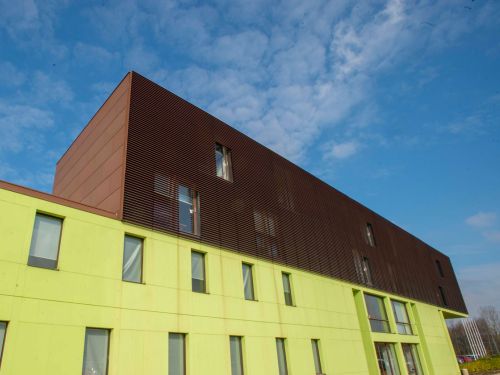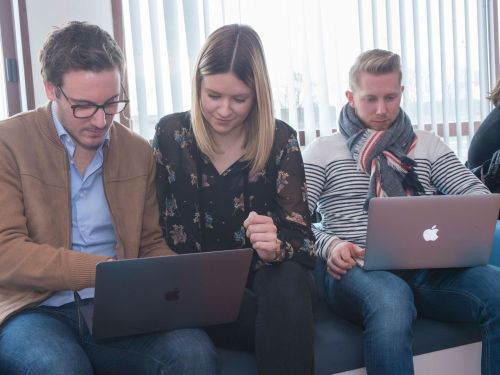Since Monday January 24th 2022 and for a duration of three weeks, Tim and Bastien will set up their food truck every lunchtime behind the IAE Metz to offer you a healthy and affordable lunch for three euros (one euro for scholarship students). They have been working on this project for a year and have been travelling from campus to campus since September with the aim of fighting against student food insecurity while offering them healthy menus. We met Tim and Bastien to know more about their project.
Who are you? What is your project? How did this project come about?
We already set up quite a few projects together: we filed a patent, we went to Senegal for a month for a solidarity project. It was a matter of course that we were going to set up other projects together.
In January 2021, a year ago, we came up with an idea, it was to try to respond to the growing food insecurity among students, due to the health crisis. We want to bring an alternative to the food system to be actors of the food transition. There is a double objective for us: to fight against student food insecurity and to accelerate food transition on campus. Then, we carried out a market study, raised 70 000 euros and bought a food truck in which we set up everything ourselves during the summer. Seven months later, we started visiting student campuses.
Since September 2021, we travel from Campus to Campus in the University of Lorraine. We stay 3 weeks on each campus before moving again. University of Lorraine is our main partner. We cook every lunchtime, except on Wednesday, organic and local vegetables based menus. These menus cost 3 euros to students plus 30 cents for the container. We invite students to bring their own containers in order to reduce the impact of this food truck.
For scholarship students, the menu costs one euro.
What do you want to bring to students through this project?
Firstly, it would be to promote healthy and responsible eating. For this, we seek to reawaken people's taste for cooking, local food and seasonal fruits and vegetables. Then, it would be to assist them in a food transition approach by giving them recipe ideas, by talking to them. We organise events to raise awareness, including one called Apple Day, when apples are available for free on campus for a day. Students have therefore free access to them. It is through those little projects that we try to ensure that the students can better feed themselves at home but also on campus.
Where do the raw materials come from?
They come from local market gardeners, we get most our supplies from organic market gardeners.
What we cannot get from local agriculture, we have to buy it in supermarkets. However, we try to reduce the amount of raw materials coming from supermarkets in favour of local and organic raw materials.
Why this idea of healthy and affordable meals?
If we want to fight efficiently against student food insecurity, we have no choice but to offer affordable prices. Also, being honest with ourselves, we are aware that fighting against precariousness is not just about giving them a pack of pasta, it also about ensuring a good diet and helping students in this process.
Overall, is this project a success? Are you satisfied with how far you have come since you started setting up on the different campuses?
Yes, absolutely. We manage to sell 70 meals every lunchtime with some students that we unfortunately had to turn away at the end. They are very fond of our organic vegetable food. It may sound surprising, but the work we do explains quite well why students come back. We see that with the dynamics we create on campus, students change their views on vegetables.
It is true that we are satisfied with our path, when we think of all that we have managed to do in such a short time. We are very proud, but above all we are very happy to see that it will last until February. Indeed, we will recruit two new students to continue the project.
Are you thinking of expanding?
We thought about it. For the time being, we are focusing entirely on this first food truck. We are trying to ensure that it will continue to work with the right objectives. Why not try to develop this project elsewhere, that would be really amazing.
Do you have any other plans in the future to improve student life and particularly student nutrition?
In the future in relation to the food truck, we will try to rethink our strategy when we arrive on a campus to have even more impact. And in particular the impact we can have with the CROUS by discussing with the actors of sustainable food, the CROUS, the University of Lorraine and the public organisations. We will try to promote a new eating style to them. In short, to accelerate the food transition!
Finally, send us an email: Click here to show mail address, we would be delighted to receive the help and support of a new student, with all their motivation, talents and ideas. Something good is bound to come out of it, it would be a real pleasure for us.
Photo : Service Communication de Mines Nancy.



